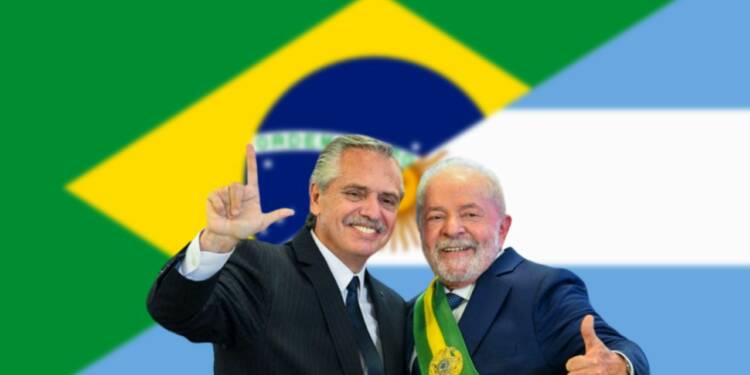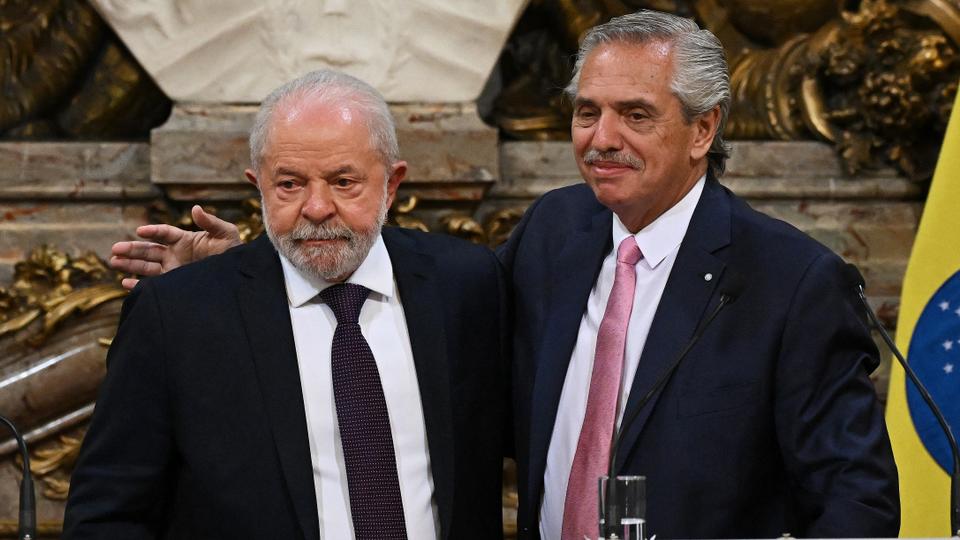[MD] If you know what money really is, it’s obvious: A common currency is “always” feasible. But that assumes that a “real” money process is employed. All currencies employing a real money process will be common…i.e. they can exchange directly in all space and time with a constant exchange rate. Further, if they are dependent on “policy” they cannot be common. When you don’t know what money is, you’re not going to be able to deploy a currency. Knowing this, let’s dissect this article.
Is a common Latin American Currency feasible?
Is a common Latin American Currency feasible?
in Americas

32
VIEWS
Share on FacebookShare on Twitter
Latin America is no stranger to foreign intervention and instability. Subject to global power play, the continent has seen extreme political turmoil and economic instability. Many leaders have tried to circumvent foreign powers and domestic chaos. The most recent ones are Argentina and Brazil.
[MD] This issue is not accidental. It is imposed, like all things economic, by the money-changers. They institute the governments. The governments then institute the money process. The money process dictates trading issues. So to eradicate this issue, get rid of the money-changers. They’re not needed and never have been. All that is needed is traders like you and me. We are the “creators of money.”
Argentina and Brazil are planning on introducing a common currency. The project has rocked the financial market. As usual, it has attracted severe criticism from the West. Several countries in Latin America have cherished the idea of a common currency, like the Euro in European Union. It may not be far, when the region will indeed realise its dream.
[MD] Why is this a “project”? And why is it left to countries? Countries are a fiction of money-changers? Don’t believe it? Examine the history. Look at how easily money-changers get boundaries changed. All traders have to do to institute a currency is to “do it”. Adopting the principles of real money, their currency will be impenatrable. Imposers can only work to copy it. They cannot compete with it. But unfortunately for all the parasites (i.e. non-traders wanting a piece of the action) the money process, and therefore the money, cannot be manipulated. It is cast in stone.
Also Read
Political Instability – Latin America’s biggest obstacle
“Stop your gun war”, Saint Vincent and Grenadines’ first iconic caveat to the United States is here!
But, how feasible is a common currency for both the countries?
Widespread support
The two biggest economies in South America have discussed ways to coordinate their currencies for many years. It was a way to challenge the dominance of the dollar in the area.

Last week, Argentina’s Alberto Fernandez and Brazil’s Lula da Silva, published a joint statement. It underlined the potential benefits of a common currency for increased regional trade. The statement read, “We have the intention of overcoming barriers to our exchange, simplifying and modernizing the rules and promoting the use of local currencies.”
[MD] This paragraph tells us this is going nowhere. If traders issued such statements there’s a chance…that could go somewhere. Get the politicians, and money-changers who place them, out of the equation and success is guaranteed. Otherwise, failure is guaranteed.
The project can position the Latin American region as a significant geopolitical and economic power. It would be able to export a wide range of goods in addition to being self-sustainable. Also, the fact, that Lula, a political heavyweight in Latin America, took up the issue demonstrates, that it has the potential to elicit strong political and emotional responses from people.
[MD] Economic power derives from trade. Trade derives from having something to trade.
The concept is not new. Fernando Haddad, an ex-presidential candidate in 2018 had proposed the idea. He even proposed the name ‘sur’, which means south. Venezuela’s President Nicolas Maduro too, had brought the idea last year. He recommended promoting the Sucre, a currency used by the ALBA coalition of states. ALBA is predominately made up of Bolivia, Cuba, and other smaller West Indies nations. Gustavo Petro of Colombia too, supports integration of Latin America.
[MD] What a great name for a currency. Name it one of the points on the compass. With stupidity beginning the discussion, can failure be far behind?
Basically, there are favourable winds across the continent for a common currency.
[MD] Traders want and need a common currency. “Favorable winds” have nothing to do with it. Continents have nothing to do with it. What it entails is a trading domain. If all trades can be effected in a certain space (e.g. state, county, city), it’s not necessary to look further. Two issues cause extending the look: (1) The domain does not encompass all the trade; or (2) Other domains trade for different things based on the abundance of the things in the domain. Ultimately, the domain is global. But that doesn’t require global control. When everyone in the trading domain is using the same process, the domain is all inclusive and expansive.
Read More: The siege of Brazilian democracy
Is a common currency feasible?
The path to a common currency can be very complicated. The countries that’ll opt for the project will have no influence over domestic policies over other nations. Thus, any domestic instability might easily derail the project.
[MD] The path to instituting a currency is trivial. Just do it. The attributes: No one creating and destroying currency is anonymous. Everyone using the currency is anonymous. The creation and destruction of the money is perfectly transparent to all. The currency cannot be counterfeited. Perpetual currency supply/demand is guaranteed in real time. Currency is in perpetual free supply. Defaults are mitigated immediately by Interest collections of like amount. And keep in mind, the currency is money in whatever form is appropriate: Ledger entry; coin; paper money; etc. It just must be in only one form at a time for each trader using it…and can change form at any time at zero cost of time or value.
Additionally, the organisation in charge of running the regional system will make all economic choices. It could possibly lead to internal skirmishes in the region where the majority of the nations are impoverished and the social and economic conditions are unequal.
[MD] With a “real” money process there are no “economic choices”. Money, when it is done right, has zero economic influence. It has zero economic dependencies. It must affect trade in no way whatever. It is just a score keeper. It is just a default mitigator. It is just a counterfeit repellant. If all money creators default, a real money process can’t work. If any counterfeit is possible, a real money process can’t work. If money restrains traders in any way, a real money process can’t work.

The biggest challenge would be to establish a common fiscal-monetary policy, which is a major undertaking and a sensitive issue for the countries.
[MD] Perfect! Prove you don’t know what money is right off the bat. Or expose your ulterior motives right off the bat. Or consider issues as sensitive right off the bat. Do any of that and you are guaranteed to fail. Assure yourself you’re not doing any of that…nor can you now or ever do any of that…and there’s a good chance you grasp what money is. You will succeed beyond your greatest expectation.
Read More: Latin America lambasts USA as it overthrows Peru’s Pedro Castillo in broad daylight
Hence, a common currency would initially require many negotiations between the future partners. It needs a strong political will and patience.
[MD] A common currency requires no negotiation at all. Let all players institute a “real” money process. Let them prove that they are not manipulating the process at all; that they can’t manipulate the process. Once that is accomplished, all the players will have an identical process. The only thing that may differ is their units. If they logically adopt the HUL (Hour of Unskilled Labor) as their unit, they immediately become unified. It’s the simplest most logical result possible. But if they all want to have different names for their money and for their money to have different value, that is stupid…but not an issue. What is the issue is this: That name and that value must never ever change over time or space.
Though, the project is not without its merits. The joint statement between Argentina and Brazil also mentions that a common South American currency will reduce their external vulnerability. It is obvious what the statement means. The countries in the region have been continuously sanctioned by USA, undermining their sovereignty.
[MD]”Will reduce their external vulnerability”: The USA, nor anyone else, can sanction against a “real” money process.
A common currency has the potential to be a game changer for the Latin American economy. By reducing transaction costs, increasing investment and promoting economic integration, it could lead to greater economic growth and development. Furthermore, it could be a major source of foreign exchange reserves for the participating countries.
[MD] Since Latin America doesn’t know what money is, instituting a new “non money” or a new “common non money” is doomed to failure. Instituting a “real” money process is trivial. Operating a “real” money process is trivial. Abiding by a “real” money process is impossible for money-changers or the governments they institute. It simply deals them out the game completely…by that greatest sanction of all…competition. You can’t compete against perfect. And you’d be a fool to compete against phony.
Ultimately, the success of the common currency will depend on how well it is implemented, and the commitment of the participating countries to make it a success. And, that’s tricky.
[MD] There are no “degrees” of instituting a “real” money process. You either do it exactly as required…or you’re not doing it at all.

 by
by